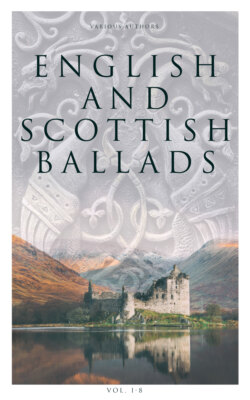Читать книгу English and Scottish Ballads (Vol. 1-8) - Various Authors - Страница 100
На сайте Литреса книга снята с продажи.
Ritson's Ancient Songs, i. 141, Sandys's Christmas Carols, p. 4: from the Sloane MS., No. 2593 (temp. Hen. VI.)
ОглавлениеThis curious little ballad was sung as a carol for St. Stephen's Day. Its counterpart is found in Danish (though not in an ancient form), printed in Erik Pontoppidan's book on the relics of Heathenism and Papistry in Denmark, 1736 (Jesusbarnet, Stefan, og Herodes Grundtvig, No. 96). There is also a similar ballad in Faroish. Only a slight trace of the story is now left in the Swedish Staffans Visa (Svenska F.V., No. 99), which is sung as a carol on St. Stephen's Day, as may very well have been the case with the Danish and Faroish ballads too.
The miracle of the roasted cock occurs in many other legends. The earliest mention of it is in Vincent of Beauvais's Speculum Historiale, L. xxv. c. 64. It is commonly ascribed to St. James, sometimes to the Virgin. (See the preface to the ballad in Grundtvig, and to Southey's Pilgrim to Compostella.) We meet with it in another English carol called The Carnal 5 and the Crane, printed in Sandys's collection, p. 152, from a broadside copy, corrupt and almost unintelligible in places. The stanzas which contain the miracle are the following:
There was a star in the West land,
So bright it did appear
Into King Herod's chamber,
And where King Herod were.
The Wise Men soon espied it,
And told the king on high,
A princely babe was born that night
No king could e'er destroy.
"If this be true," King Herod said,
"As thou tellest unto me,
This roasted cock that lies in the dish
Shall crow full fences 6 three."
The cock soon freshly feather'd was,
By the work of God's own hand,
And then three fences crowed he,
In the dish where he did stand.
"Rise up, rise up, you merry men all,
See that you ready be;
All children under two years old
Now slain they all shall be."
5 crow?
6 rounds?
Seynt Stevene was a clerk in kyng Herowdes halle,
And servyd him of bred and cloth, as ever kyng befalle.
Stevyn out of kechon cam, wyth boris hed on honde;
He saw a sterr was fayr and bryght over Bedlem stonde.
5 He kyst adoun the bores hed, and went into the halle: "I forsake the, kyng Herowdes, and thi werkes alle.
"I forsak the, kyng Herowdes, and thi werkes alle:
Ther is a chyld in Bedlem born is beter than we alle."
"Quhat eylyt the, Stevene? quhat is the befalle? 10 Lakkyt the eyther mete or drynk in kyng Herowdes halle?"
"Lakit me neyther mete ne drynk in kyng Herowdes halle:
Ther is a chyld in Bedlem born is beter than we alle."
"Quhat eylyt the, Stevyn? art thu wod, or thu gynnyst to brede? Lakkyt the eythar gold or fe, or ony ryche wede?"
15 "Lakyt 'me' neyther gold ne fe, ne non ryche wede; Ther is a chyld in Bedlem born xal helpen us at our nede."
"That is al so soth, Stevyn, al so soth, i-wys, As this capon crowe xal that lyth her in myn dysh."
That word was not so sone seyd, that word in that halle,
20 The capon crew, CHRISTUS NATUS EST! among the lordes alle.
"Rysyt up, myn turmentowres, be to and al be on, And ledyt Stevyn out of this town, and stonyt hym wyth ston."
Tokyn he Stevene, and stonyd hym in the way; And therefor is his evyn on Crystes owyn day.
2. befalle, befell.
5. kyst, cast.
9. eylyt, aileth.
13. wod, mad: gynnyst to brede, beginnest to entertain capricious fancies, like a woman, &c.
